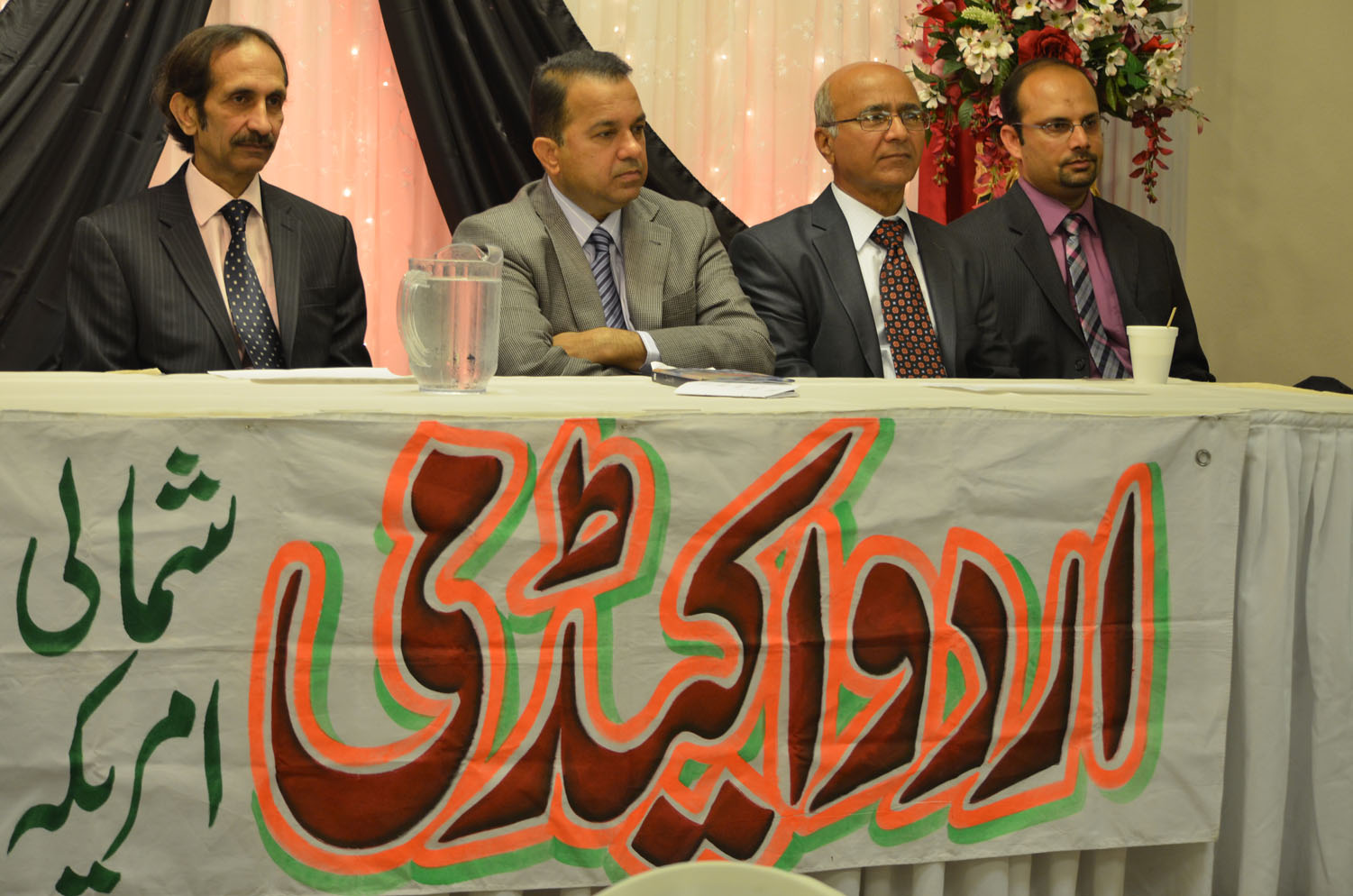|
Another interesting feature of the mushaera was launching of Fayyaz Saieb's new collection of poetry "Kuchh Khawab Uthae Phirta HouN." Prof. Lubna Manzar presented an in-depth maqala on the poetry of Fayyaz Saieb who travelled from Maryland to attend the Mushaera.
This is the second anthology of his poetry. His first diwan entitled “Moam Ke Sheher Mein Dhoop” (Sun in the town of wax) was launched in December 2001 by the Urdu Academy.
Among the local or host poets, Tashi Zaheer is ‘sahib-e-diwan.’ His poetry under the title – Shaam Kii Aahat – was launched in April 2011. Canada-based Ashfaq Hussain, a leading modern Urdu poet and an author of more than 10 books of poetry and literary criticism read a maqala on Tashie Zaheer’s diwan. Ashfaq Hussain says: “It is necessary that the work of a Diaspora poet/writer should be analyzed and critically evaluated in his/her native home.”
Farooq Taraz is a long time resident of San Francisco and an established poet in USA for many years.
Ahmer Shahwar belongs to a poetic family and poetry is in his blood. Sehba Lakhnawi is his grandfather.
Karachi-born Arshad Rasheed is software engineer by profession but poetry is his obsession.
Prof. Lubna Manzar has inherited poetry from her father, a prominent poet Jazib Qureshi. The Urdu Academy has the honor to host Jazib Qureshi sahib twice.
Salman Siddiq is an Urdu teacher in Monterey.
Syed Misum Moosavi hails from Hyderabad, India.
Waqar Khan is a banker by profession but has an academic family background.
Misbah Rehman is a software engineer by profession, but Urdu Poetry is his passion. He was born and raised in Khyber Pakhtoonkhwa (Pakistan). Misbah is writing poetry for about 23 years now. His first anthology of poetry will be published soon. He is running a web-site www.urdudil.com, which contains selected poetry of more than 1400 poets all over the world. He is adding new poets almost every day to the urdudil database.
The program concluded with a musical presentation of Nazir Kazmi's poetry by Tina Mann, a popular Bay Area singer.
At the outset, Tashie Zaheer President of the Urdu Academy of North America, welcomed the guests on behalf of the Academy which holds regular monthly Urdu literary sessions under the patronage of entrepreneur Syed Sarwat.
The Urdu Academy of North America, under the leadership of poet Tashi Zaheer and patronage of entrepreneur Syed Sarwat, is serving the cause of Urdu very devotedly, dutifully and religiously. It’s monthly literary events, at the Chandni Restaurant in Fremont/Newark, are very popular and attract Urdu enthusiasts from other nearby towns.
The Urdu Academy takes the arduous job of holding a grand Mushaera or ‘Poetical Symposium' every year to cater the interest of Urdu lovers in poetry which gives a person a voice. Poetry lets you see through the eyes of another, and this is why poetry is important. Recognizing this importance, in 1996 the month of April was declared the National Poetry Month by the Academy of American Poets. And not surprisingly, in 1999, UNESCO (the United Nations Educational, Scientific and Cultural Organization) declared March 21 to be World Poetry Day.
Poetry is very important in human life, the precise origins of which are unknown. Poetry as an art form may predate literacy. Thus many ancient works, from the Vedas (1700 - 1200 BC) to the Odyssey (800 - 675 BC), appear to have been composed in poetic form to aid memorization and oral transmission, in prehistoric and ancient societies.
The oldest surviving poem is the Tale of the Shipwrecked Sailor, written in Hieratic and ascribed a date around 4500 B.C.E. Other sources ascribe the earliest written poetry to the Epic of Gilgamesh written in cuneiform. The oldest epic poetry besides the Epic of Gilgamesh are the Greek epics Iliad and Odyssey and the Indian Sanskrit epics Ramayana and Mahabharata. The longest epic poems ever written were the Mahabharata and the Tibetan Epic of King Gesar. [Wikipedia]
Hence, poetry is ancient. The most primitive peoples have used it, and the most civilized have cultivated it. Poetry is a language that says more and says it more intensely than does ordinary language. Poetry exists to communicate significant experience imaginatively and creatively, deepening our knowledge of the senses more poignantly.
See more pictures on page 1 of 4 pages
|